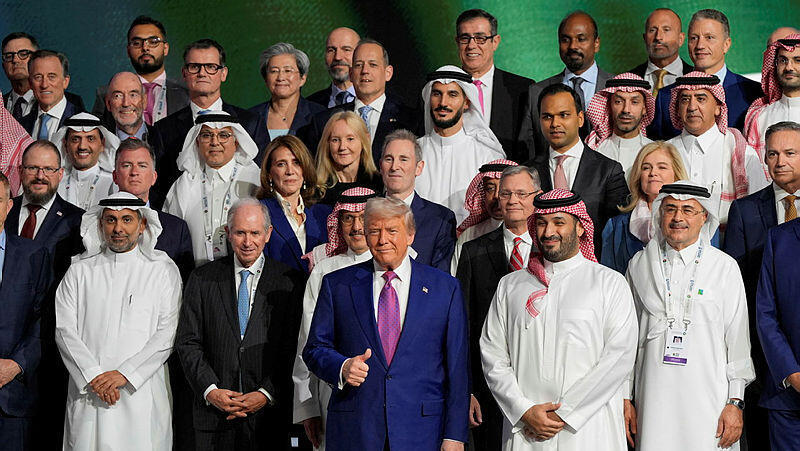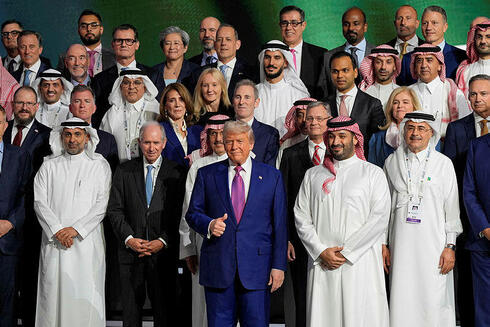
Opinion
Trump's Riyadh party went on without Israel. Can it still join fashionably late?
Trillions changed hands, and global CEOs struck massive deals. Israel wasn’t there, but its tech still might afford it a seat at the table.
Thousands of Israeli businessmen and technology entrepreneurs watched U.S. President Donald Trump’s speech in Riyadh yesterday and pulled their hair out in frustration. Hundreds of billions of dollars were flying from side to side, and while a long line of investors and CEOs of technology companies effortlessly scooped up the near-limitless petro-dollars the Saudis served on fancy gold platters - Israel wasn’t invited to the party at all. And it’s not that it didn’t have the opportunity to receive an invite from Trump. It did. More than once. But the government, led by Benjamin Netanyahu, apparently prefers to focus on destruction (including self-destruction) and assassinations of terrorists motivated by petty political interests and messianic ideologies of revenge.
Such a global investment frenzy hasn’t been seen for decades, and it’s doubtful whether such massive sums, estimated in the trillions, have ever been concentrated in one place in modern economic history. The Saudi-American Investment Forum brought together under one roof President Trump, Saudi Crown Prince Mohammed bin Salman, and a long and impressive line-up of CEOs and key figures from American technology and business, including Elon Musk, Sam Altman of OpenAI, Jensen Huang of Nvidia, the CEO of Amazon, and many others.
The pretext for the event may have been political, but it quickly became clear that it was primarily a platform for announcing deals and investments on an enormous scale — the cumulative value of which exceeded one trillion dollars. Saudi Arabia pledged to invest around $600 billion in key U.S. sectors, including energy, security, infrastructure — and artificial intelligence. A massive $142 billion arms deal was signed, alongside tens of billions more in smaller deals across AI, medicine, robotics, and industry, involving companies like Google, Oracle, AMD, and Tesla.
Nvidia, for example, will supply Saudi Arabia with 18,000 advanced chips and help build a massive data center. A new Saudi national AI company called Humain was announced, with an essentially unlimited budget and direct partnerships with the world’s most powerful firms, all aimed at making the kingdom a global AI powerhouse. Saudi Arabia, together with the United Arab Emirates and Qatar, is showing a clear willingness to pour vast sums into advanced technologies, particularly AI and supporting infrastructure, as part of a bold economic vision to diversify and reduce reliance on oil.
This event, which cast the Middle East as a new center of innovation and a global tech hub, only reinforced a growing sense among Israeli entrepreneurs and investors that Israel is missing out on a historic - perhaps once-in-a-lifetime - opportunity. While Saudi Arabia announced strategic partnerships and huge investments in the most critical technologies of the future, Israel remained outside the party, without a seat on the investment express train.
The finger of blame is pointed mainly at Prime Minister Benjamin Netanyahu and his coalition partners, who are turning their backs on the opportunity Trump has placed before us - out of narrow political interests and the pursuit of personal survival. The government’s insistence on military confrontation, steered by extremist and messianic coalition partners, is undermining the possibility of meaningful political and economic agreements. As it stands, Israel risks losing not only a huge diplomatic opportunity and billions in deals, but also facing isolation - politically, economically, and technologically.
Still, is the picture so bleak and final? Has Israel truly missed the diplomatic and business train, or can it still join the celebration that began yesterday in Saudi Arabia — and show up “fashionably late"?
The answer may lie in the analysis offered this week by Yifat Oron, Senior Managing Director at Blackstone and Head of the Tel Aviv Office, during a discussion at Google and Calcalist’s Startup Week: “The world’s interest in Israel is not because we are nice, but because we are needed,” she said in response to a question about Israel’s status in the global tech ecosystem. Oron emphasized that multinational corporations and global investors don’t come here out of courtesy, but out of a real need for the technology and the high-quality teams Israel offers. According to her, foreign investors know they can generate strong returns here — and that’s why Israel’s appeal will continue.
The Americans, the Saudis, and the other Gulf nations know this. And even if Trump chose to ignore Netanyahu - perhaps as a form of protest over his refusal to align with a broader peace vision for the Middle East - there’s still hope. Israeli high-tech has consistently produced the solutions the world needs: from telecommunications and semiconductors in the past to cybersecurity and AI in recent years. This ability to develop the right technologies at the right time, to scale companies globally, and to deliver successful exits and IPOs - continues to attract international investors, even amid significant challenges.
So despite Trump’s conspicuous snub of Netanyahu, the Israeli business delegation was present yet absent in Riyadh. Not just because of Israel’s geographic location between East and West, but also because of the strategic significance of its tech industry to the global giants that struck billion-dollar deals with the Saudis. Almost every senior figure representing American tech and business at the event leads a company with strategic assets in Israel.
Related articles:
Among them: Blackstone CEO Stephen Schwarzman; Nvidia CEO Jensen Huang, whose company is one of the largest private tech employers in Israel; Ruth Porat, president and chief investment officer of Alphabet, which is acquiring Israeli cyber firm Wiz for $32 billion and runs a major R&D hub in the country; and Andy Jassy, CEO of Amazon, who visited the company’s Haifa development center just three months ago.
Even Trump - the guest of honor of the event - left the door open for Israeli politicians to seize this historic opportunity when he declared that Saudi Arabia is welcome to join the Abraham Accords, signaling potential normalization with Israel. Ultimately, despite its physical absence from Riyadh’s main stage, everyone knows Israel still has something to offer. The strength of Israeli high-tech and its indispensability to major global players create a potential workaround, even as politics get in the way. Israel’s hidden influence - through the strategic deals of international companies deeply embedded in its economy - and Trump’s invitation to join the Abraham Accords, suggest that the door to future cooperation is still ajar.
Israel may indeed be late to the party - but it can still arrive fashionably late and take its place at the center of the Middle East’s emerging technological and economic celebration.
